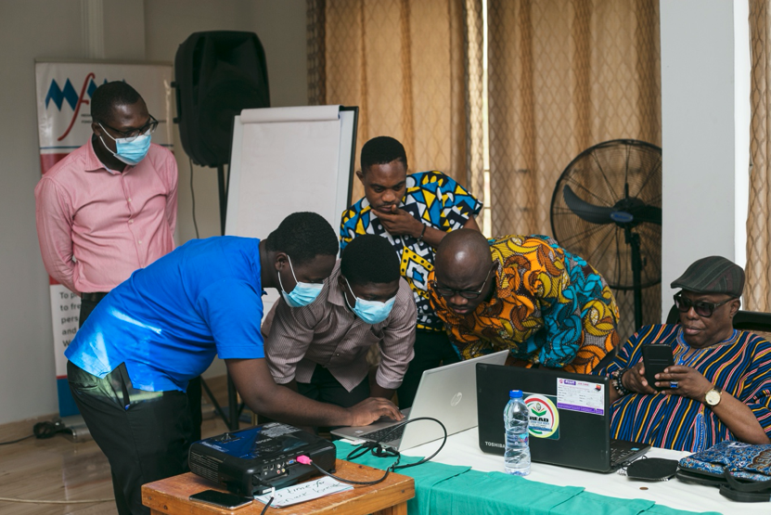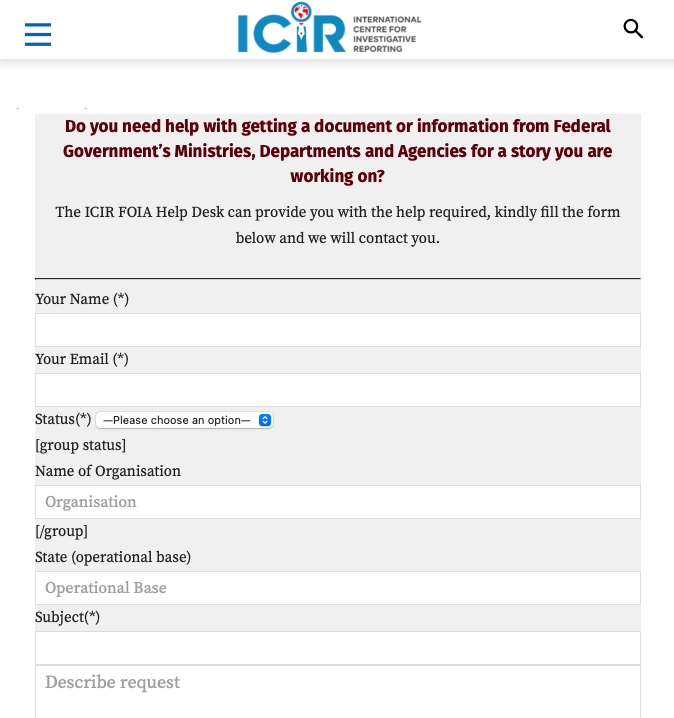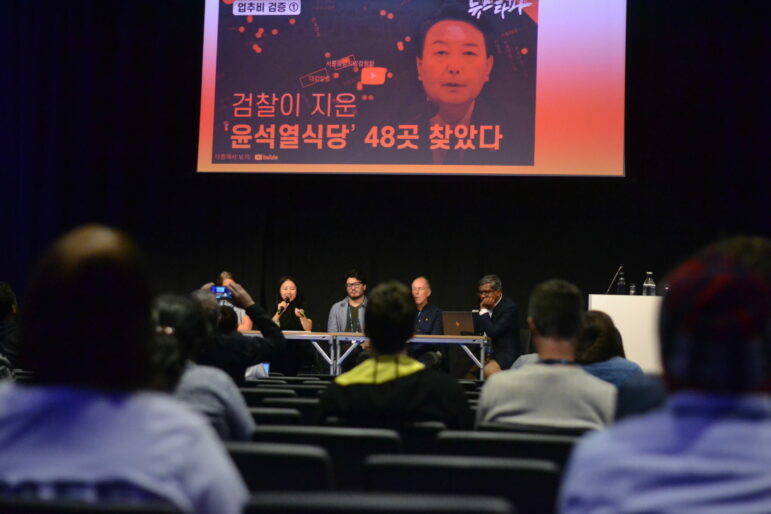

Image: Shutterstock
Behind the FOI Desk: Using Freedom of Information Laws to Fuel Accountability Stories in Africa
In many African countries, media outlets have long positioned themselves as watchdogs, championing transparency and accountability as key pillars of democracy. Through investigative reporting, they expose how public funds, including taxpayers’ money, are allocated and spent. Additionally, they play a crucial role in empowering citizens who lack awareness and literacy by encouraging them to actively seek information on public procurement, government expenditures, and financial details of capital projects.
Freedom of Information (FOI) laws are essential for transparency and accountability and can be a key tool in holding the powerful to account, yet their adoption and enforcement across Africa remain inconsistent. As of 2024, 29 out of 55 African countries have FOI laws, but implementation and consistent enforcement often falls short due to political resistance, bureaucratic delays, and limited public awareness.
When the current state of right-to-information access is compared to a 2014 report by the Africa Freedom of Information Centre, progress has been made, but many of the same challenges persist, including government reluctance to release information and the use of restrictive secrecy laws.
FOI laws are relatively new to Africa, with South Africa being the first country to enact one, in 2000. AmaBhungane, a GIJN member, is using FOIs to do transformative advocacy work in South Africa. And while other countries like Sierra Leone, Nigeria, and Ghana, have relatively stronger FOI frameworks on the books, others lag behind in both legislation and responsiveness. The broader trend suggests that despite growing recognition of the right to information, practical access remains limited, requiring stronger advocacy and legal reforms. (For more on access to public records in Africa, see GIJN’s Resource Center page on the topic.)
Nevertheless, newsrooms in Africa have taken steps to challenge a lack of government transparency and reshape the narrative by creating dedicated news desks that leverage FOI requests for watchdog reporting.
Exposing Corruption in Nigeria
One such example is the FOI desk established in 2019 at the International Centre for Investigative Reporting. ICIR, a GIJN member, plays a crucial role in promoting transparency by enabling investigative and accountability journalists to access information on government spending, project execution, and accountability.
FOI desk manager James Emmanuel tells GIJN: “Through FOI requests, journalists and citizens can track how public funds are allocated, who is awarded contracts, and the progress of government projects.” But even how the Nigerian government does or does not follow through on FOI requests can be an opportunity for accountability reporting. In 2023, ICIR published a data analysis that found a few areas of improvement, but that more than 150 of the government’s ministries, departments, and agencies (MDAs) ranked in the lowest category for actively responding to legitimate requests.
This goal of the FOI desk was a practical one. It seeks to simplify the process of accessing government-held information, ensuring that journalists, including freelancers, can access the documents they need for their stories. Freelancers can submit their FOI requests through ICIR’s FOI Help Desk, where the team will help review and process them. Once approved by the editor, the request is dispatched to the designated officer of the relevant government office — either physically within Abuja or via soft copy for locations outside the country’s Federal Capital Territory.
Emmanuel says that even though challenges remain — among them: non-responsiveness, delays, and refusals to release information — the FOI Desk has recorded significant achievements. The ICIR has joined a coalition that evaluates 250 Nigerian government agencies every year based on transparency, conducted investigative reports using FOI responses, and even taken legal action against agencies failing to comply.
Abdulrasheed Hammed, a Nigerian freelance journalist, has been an active user of the ICIR FOI Desk since 2022, when he was selected as a fellow of ICIR’s Open Contract Reporting Project. With a focus on exposing corruption in public procurement, Hammed recalls that even though many of the FOI requests went unanswered — something sadly common even in countries with otherwise robust press transparency laws —, he points to one of the investigations that benefited from FOI information during his fellowship. In that investigation, he exposed how a project was abandoned after the contractor had received the funds allocated for it.
Other groundbreaking ICIR investigations supported by FOI requests in Nigeria include reports on human rights abuses perpetrated the Economic and Financial Crimes Commission EFCC, suspicious road contracts, environmental crises in Nigeria’s Benue state, and fraud allegations involving a former police commissioner.
A newcomer to this right to information effort in Nigeria is the HumAngle FOI hub. Launched in May 2024, this project deliberately tries to tackle the skepticism that has kept many Nigerians from engaging with FOI laws.
Angela Omoru explains that, beyond simplifying the request process with a user-friendly platform and templates, HumAngle’s FOI Hub functions as a mediator offering both technical support and institutional accountability. Recognizing that mistrust and poor institutional responsiveness often deter engagement, HumAngle designed a system where each submission is acknowledged, verified, and followed up, building a feedback loop that restores a sense of agency to the investigative journalist or civic actor making the request.
What’s particularly compelling is HumAngle’s understanding that trust isn’t built through software alone. Through national outreach, radio promotion, and a landmark all-female roundtable on right to information laws and accountability, the organization is widening the FOI discussions to include groups often excluded from such processes.
These efforts not only address a critical gender gap but also humanize the FOI process, showing investigative journalists and citizens alike that their demands for accountability are valid and supported. Even in the face of a documented, very high non-response rate, HumAngle sees value in this data, as it exposes patterns of institutional silence and becomes a tool for targeted advocacy. In doing so, the project doesn’t just facilitate access to information; it actively works to shift the public perception of what’s possible through investigative journalism and civic engagement.
New Frontline for Civic Accountability in Ghana
To improve access to government-held information in Ghana, the Media Foundation for West Africa (MFWA) established the Citizens’ Access to Information Support Center two years ago after that country’s RTI law was enacted in 2020. (In 2024, GIJN welcomed MFWA as a member of its network.)
According to Adiza Moro Miaga, the program officer overseeing the center, it highlights the crucial role of investigative journalists in promoting accountability and helps the public, especially vulnerable groups, navigate the RTI process.
Adizatu Moro Maiga, a MFWA program officer, emphasizes that the “RTI law is critical for national development and MFWA’s way of raising awareness and empowering the public to participate in accountable governance processes and hold those in power in check.”
By offering training workshops, bootcamps for journalists, and providing RTI resources, the MFWA equips investigative journalists with the tools needed to request vital government information, enabling them to scrutinize public institutions and ensure accountability in governance.
The organization has developed and distributed RTI guidebooks to both the media and the general public to enhance awareness and accessibility.
These boot camps have already proven transformative for many participants, equipping investigative journalists with practical skills and fresh perspectives to enhance their storytelling.
For example, at a recent MFWA session in Accra, GHOne TV’s Fritz Dela Amegashie learned critical lesson from a session with journalist-lawyer Samson Lardy Anyenini: understanding how to frame RTI requests in the public interest. “It is something that I would ordinarily not bother to include in a request,” he admits. “For me, it was a wake-up call.” These testimonials underscore the impact of the project’s outreach, not just in building capacity but in deepening journalists’ grasp of legal tools and digital storytelling strategies crucial to accountability reporting.

Journalists working on a group project at a MFWA right to information and story development boot camp in Aburi, Ghana. Image: Screenshot, MFWA
The project reinforces the ongoing work of the RTI desk at The Fourth Estate, a media platform of the MFWA. Philip Teye Agbove, an investigative journalist, said requesting information for their reporting often comes with significant challenges—threats, intimidation, and bureaucratic resistance.
In one instance, after submitting an RTI request on a government project, a local government official called Teye back and not only refused to release the information but also dismissed his legal right to make such requests.
“Despite these barriers, impactful reporting continues to drive change,” Teye says, noting that information requests have played a role in more than 18 of his accountability stories.
“One of my most notable investigations examined the government’s unfulfilled promise of providing $1 million each to agencies to improve public sanitation, which not only sparked national attention but also led to action from one of the deprived agencies. This story later earned Teye recognition as the Online News Journalist of the Year at the 2024 Ghana Journalists Association Media Awards.
Pushing for Greater FOI Transparency in Sierra Leone
MWFA’s efforts have also crossed borders into Sierra Leone, where journalists like Martha Kargbo are taking up the challenge. Kargbo, an investigative journalist and media trainer, has been actively using right to access information requests to produce groundbreaking stories, while training young journalists on how to navigate the law for their own accountability reporting.
Kargbo gained national attention in 2020 after she sued the Bank of Sierra Leone for its failure to provide information for her story on its foreign exchange history. Ultimately she prevailed in a notable decision by the nation’s Right to Access Information Commission (RAIC), which adjudicates disputes between the government and information requesters. The bank was subsequently fined 70 millions leones (US$3,000) for its failure to comply. As of March 2025, the bank is still appealing the decision.
Ibrahim Sheaga Shaw, RAIC chairman, said that Kargbo’s suit was among many of the actions taken against institutions in the country who have been accused of flouting the transparency conditions of the right to information law.
More FOI Laws — and Strengthen Those That Exist
The experiences of investigative journalists across Africa underscore that while FOI and RTI laws are vital tools for accountability, their effectiveness depends on enforcement, institutional support, and persistent advocacy. Journalists across parts of Africa have faced threats, refusals, and legal roadblocks, yet continue to push boundaries through innovative newsroom initiatives. These platforms not only simplify access to information but also build public trust and equip reporters with the tools needed to hold power to account.
As Gilbert Sendugwa, executive director of the Africa Freedom of Information Centre (AFIC), noted in an interview marking a recent International Day for Universal Access to Information, the real challenge lies not in passing FOI laws, but in enforcing them effectively — requiring journalists to be supported by strong legal frameworks, civic coalitions, and institutional pressure.
“Whereas there has been progress in some areas like awareness-raising and training of some officials, there is more to be done,” he explained. “Capacity building for public officials, civil society and journalists, enforcing compliance by public agencies to disclose requested information and proactive disclosure as well as strengthening oversight for RTI implementation.”
 Abdullahi Muritala is a freelance journalist based in Nigeria, specializing in investigative reporting, solution journalism, social justice, and disinformation analysis. He is active on X as @FixerAbdul.
Abdullahi Muritala is a freelance journalist based in Nigeria, specializing in investigative reporting, solution journalism, social justice, and disinformation analysis. He is active on X as @FixerAbdul.









